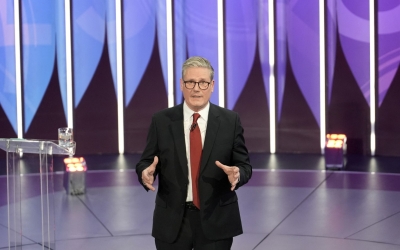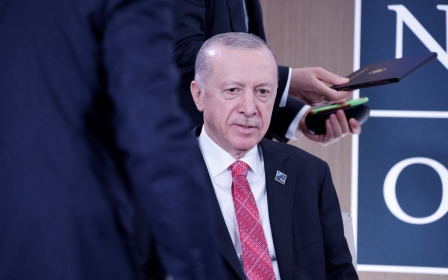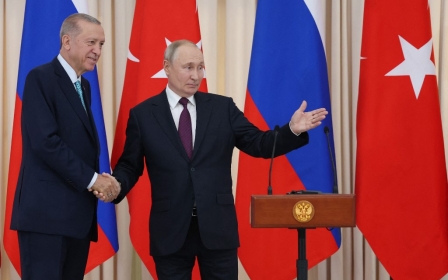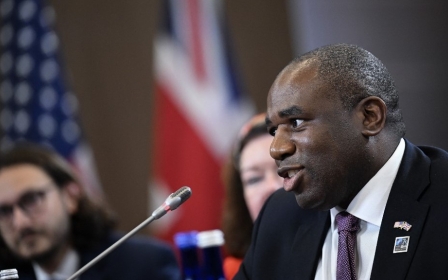UK-Turkey relations on course as first Starmer-Erdogan meeting goes well
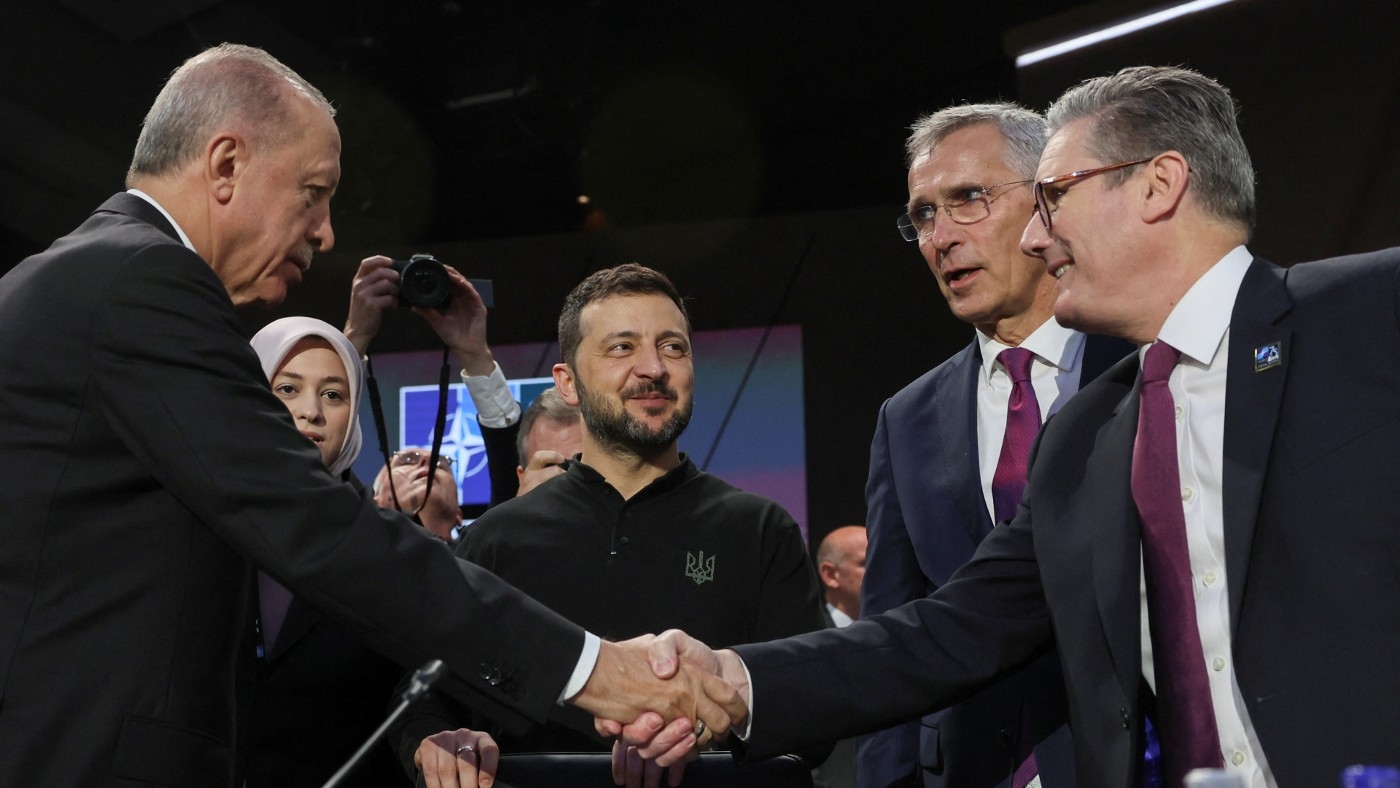
There had been some concern among Turkish observers ahead of the first meeting between British Prime Minister Keir Starmer and Turkish President Recep Tayyip Erdogan last week on the sidelines of the Nato summit in Washington.
The newly elected prime minister, not widely perceived as having a warm personality, faced doubts over whether he would get along well with Erdogan, a deeply conservative leader.
But the meeting reportedly went better than expected.
"Starmer was more charismatic than they expected," said one Turkish source familiar with the encounter. "The meeting went well, as they exchanged notes on regional developments and invited each other for a state visit."
A second person familiar with the meeting indicated that Starmer emphasised the urgency for a ceasefire in Gaza during the talk with Erdogan. For many in Ankara, this call has come too late, given the number of Palestinians killed already and the widespread extent of the destruction caused by Israel's assault.
New MEE newsletter: Jerusalem Dispatch
Sign up to get the latest insights and analysis on Israel-Palestine, alongside Turkey Unpacked and other MEE newsletters
Despite the positive start, questions remain about how Turkey and the UK will cooperate under a Labour government, a scenario Ankara hasn't experienced for the past 14 years.
There is general optimism about the prospect of relations between the two Nato allies, who have deep trade and defence ties.
"I received a good hearing whenever I spoke of the importance of Turkey to the UK with Labour Party shadow ministers, as they then were, before the election," said Peter Westmacott, a former British ambassador to Turkey.
"[Foreign Secretary] David Lammy, of course, visited Ankara in March, and other front-bench spokespeople have been in touch with their Turkish colleagues."
'Starmer was more charismatic than they expected. The meeting went well'
- Turkish source
A person familiar with Lammy’s visit to Ankara noted he was pleasantly surprised by his experience in Turkey. "Lammy made efforts to keep the dialogue between Turkey and the Labour Party going," the person said.
Stephen Doughty, now a British foreign office minister, visited Istanbul in December, meeting Turkish businesspeople and others.
Dominick Chilcott, British ambassador to Turkey from 2018 to 2022, believes the new government will adopt a pragmatic foreign policy, recognising Turkey's role in maintaining stability in an unstable neighbourhood.
"I would expect the new British government to fully appreciate Turkey’s strategic value," Chilcott said. "The war in Ukraine and the Gaza conflict make Turkey even more important in international affairs."
'Progressive realism'
However, challenges remain. "There are lots of Labour MPs who don't see the PKK as a terrorist organisation," said Ceren Kenar, a senior consultant on foreign affairs, based in London.
"Feryal Clark is one of them. Labour MPs tried to delist PKK from the terror list in 2021, and the Conservative Party at the time blocked the move."
The Kurdistan Workers' Party (PKK) is banned in Turkey and designated a terrorist organisation. It has been proscribed in the UK since 2001.
'The war in Ukraine and the Gaza conflict make Turkey even more important in international affairs'
- Dominick Chilcott, former British ambassador to Turkey
Clark, a Turkish-born Kurdish citizen, recently became a parliamentary under-secretary of state for the Department for Science, Innovation and Technology.
Kenar points out that unlike the Conservatives, the more left-wing segment of the Labour Party tends to support Kurdish groups in Turkey and Syria.
The Labour left, though, has been sidelined under Starmer, and Kenar notes that Lammy takes a supposedly more pragmatic approach to foreign policy, a doctrine he describes as "progressive realism".
This stance is billed as a mid-point between realism and idealism, whereby the UK cares about international development and a rules-based order while also prioritising national interests.
"So, given that they have emphasised realism, and given that Turkey is a very important ally of the UK, I think these differences will be downplayed," Kenar said, referencing differences over Kurdish groups.
A Labour source closely following Turkey-UK relations agreed. The source mentioned that the PKK wouldn't be delisted any time soon and that the new British leadership would focus on maintaining a good relationship with a Nato ally.
"But it doesn’t mean we will be silent in the face of human rights abuses," the source added. "Any Turkish incursion in Syria against the Kurdish groups won’t go well with the new government, considering the instability we are experiencing at this time."
Experts underline that Starmer is prioritising domestic politics, which may also intersect with Turkey.
"Labour has priorities on immigration, trade and defence," said a separate source. "Turkey is an indispensable partner in combating illegal immigration, and an update to the free trade agreement that includes the services sector is currently being negotiated between the two governments."
The source suggested that the new British government could be motivated to ratify the deal, as the UK has a distinct advantage in the services sector over Turkey, but it would still require genuine political will.
"Both countries have strong defence cooperation, as Ankara wants to purchase Eurofighter Typhoon jets," the source said. "And the new government is expected to back the sale if they can convince Germany to lift its veto."
Turkey plans to purchase 40 Eurofighters from the consortium of the UK, Germany and France, yet Berlin has been blocking the sale over concerns regarding Turkey’s military actions in Syria and Iraq.
The UK risks losing thousands of jobs if orders from foreign buyers such as Turkey and Saudi Arabia continue to be blocked.
"The UK defence ministry is very interested in selling everything possible to Turkey," a British investor noted. "I highly doubt Starmer would act any different."
Middle East Eye delivers independent and unrivalled coverage and analysis of the Middle East, North Africa and beyond. To learn more about republishing this content and the associated fees, please fill out this form. More about MEE can be found here.


